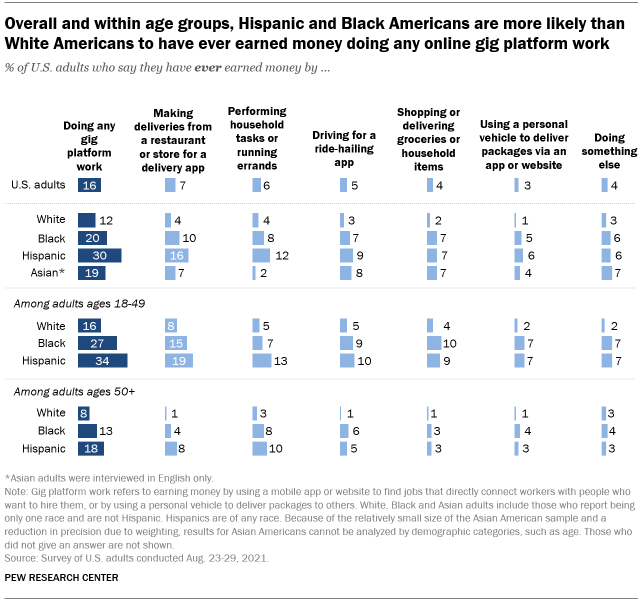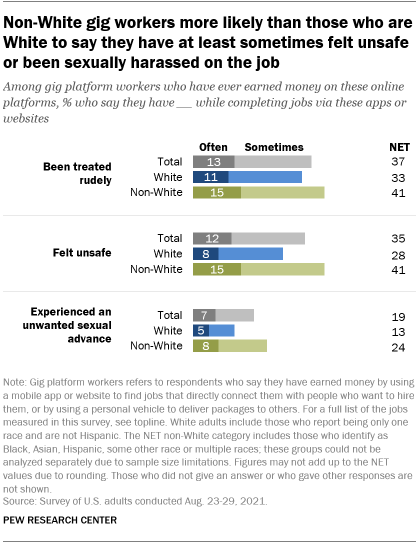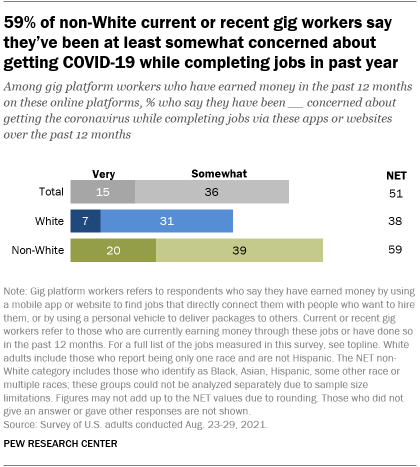From delivering groceries to driving others where they need to go, some Americans are turning to gig jobs to earn money. In fact, 16% of U.S. adults have ever earned money through an online gig platform, including 9% who have done so in the past year, according to a Pew Research Center survey conducted in August 2021. But there are racial and ethnic differences when it comes to who takes on these jobs and the negative experiences some gig platform workers say they face.
Pew Research Center conducted this study to understand Americans’ experiences and attitudes related to earning money from online gig platforms. For this analysis of the differences among gig workers by race and ethnicity, we surveyed 10,348 U.S. adults from Aug. 23 to 29, 2021.
Everyone who took part in the survey is a member of the Center’s American Trends Panel (ATP), an online survey panel that is recruited through national, random sampling of residential addresses. This way, nearly all U.S. adults have a chance of selection. The survey is weighted to be representative of the U.S. adult population by gender, race, ethnicity, partisan affiliation, education and other categories. Read more about the ATP’s methodology.
Here are the questions used for this analysis, along with responses, and its methodology.
A note about who is considered a ‘gig platform worker’ in this analysis
Pew Research Center measured Americans’ experience with gig platform jobs by asking if they had ever earned money by using certain types of mobile apps or websites to do any of the following:
- Driving for a ride-hailing app (such as Uber or Lyft)
- Shopping for or delivering groceries or household items (such as Instacart or Peapod)
- Performing household tasks like cleaning someone’s home or assembling furniture, or running errands like picking up dry cleaning (such as TaskRabbit or Angi)
- Making deliveries from a restaurant or store for a delivery app (such as DoorDash or UberEats)
- Using a personal vehicle to deliver packages to others via a mobile app or website such as Amazon Flex
- Doing something else along these lines
In all, 16% of Americans have ever earned money in at least one of these ways and are considered “gig platform workers” in this analysis.
A note about the Asian American sample
This survey includes a total sample size of 361 Asian Americans. The sample includes English-speaking Asian adults only and, therefore, may not be representative of the overall Asian American population. Despite this limitation, it is important to report the views of Asian Americans on the topics in this study. As always, Asian Americans’ responses are incorporated into the general population figures throughout this report. Asian Americans are shown as a separate group when the question was asked of the full sample. Because of the relatively small sample size and a reduction in precision due to weighting, results are not shown separately for Asian Americans for questions that were only asked of a random half of respondents (Form 1/Form 2) or some filtered questions. We are also not able to analyze Asian American respondents by demographic categories, such as gender, age or educational attainment.
A note about the non-White sample for gig platform workers
The NET non-White category for gig platform workers includes those who identify as Black, Asian, Hispanic, some other race or multiple races. It is the unit of analysis for findings among gig platform workers because the sample sizes for some of the non-White categories are too small to analyze individually. The combined category is used so that broad comparisons can be made to highlight differences between groups. When possible, the Center prefers to break out subgroups to show the differences that may exist between groups of people. The use of a NET non-White category is not intended to obscure the fact that the experiences and behaviors of Black Americans, Hispanic Americans, and Americans of other races and ethnicities may be quite different.
Hispanic adults are more likely than other racial or ethnic groups to have done gig work: 30% of this group have ever earned money through an online gig platform, compared with 20% of Black adults, 19% of Asian adults and even smaller shares of White adults (12%).
Taking on gig jobs also varies substantially by age, with adults under age 50 about twice as likely as those ages 50 and older to have ever done this type of work (22% vs. 10%). And while younger generations tend to be more racially and ethnically diverse compared with older ones, age alone does not fully account for the racial and ethnic gaps present within this workforce. Even among adults under the age of 50, Hispanic (34%) or Black Americans (27%) are more likely than those who are White (16%) to have earned money via an online gig platform.
While racial and ethnic gaps are present in each type of gig job measured in this survey, there are some tasks where these differences are more pronounced. For example, 16% of Hispanic adults say they have ever made deliveries from a restaurant or store for a delivery app, compared with one-in-ten Black adults, 7% of Asian adults and 4% of White adults. Hispanic adults are also more likely to report they have ever performed household tasks or run errands through gig work platforms than are Black, White or Asian adults.
There are also differences when it comes to earning money through two or more types of gig jobs. Gig platform workers who do not identify as White are more likely than those who are White to have earned money via multiple types of gig jobs (48% vs. 30%).
The findings on earning money via any gig platform work are mostly in line with the Center’s 2016 survey that found Hispanic or Black adults were more likely than White adults to have earned money through an online gig platform in the past year. (Due to sample size limitations, figures for Asian Americans could not be reported separately in 2016.) While the current figures are not directly comparable to the earlier study due to changes in question wording, it is clear that earning money through gig jobs continues to be more common for those who are not White than for those who are.
The rise of the gig economy has touched off wide-ranging debates about its impact on workers. While some credit these platforms with providing greater freedom and flexibility, others have raised concerns about perceived racial biases in customer rating systems as well as the lack of legal protections available to a workforce that Hispanic, Black or Asian adults are particularly likely to participate in.
The current survey finds majorities of White (76%) and non-White (81%) gig platform workers say their experience with taking on these jobs has been positive. However, those who are not White are more likely to report troubling encounters, specifically feeling unsafe or experiencing unwanted sexual advances, while on the job. (The NET non-White category for gig platform workers includes those who identify as Black, Asian, Hispanic, some other race or multiple races.)
Indeed, 41% of non-White gig workers say they have at least sometimes felt unsafe while completing jobs, compared with 28% of those who are White. Non-White gig workers are also about twice as likely as their White counterparts to say they have often felt unsafe while working (15% vs. 8%).
Additionally, gig workers who do not identify as White are more likely than those who do identify in this way to say they have often or sometimes experienced an unwanted sexual advance on the job (24% vs. 13%). (There are no statistically significant differences between White and non-White gig workers in reporting being treated rudely while completing jobs at least sometimes.)
Some gig jobs may require contact with the public, thereby potentially increasing workers’ risk of exposure to COVID-19. Some 51% of gig workers who have earned money through these platforms over the past year say they have been at least somewhat concerned about getting the coronavirus while on the job in that time frame, according to the August survey.
Health concerns related to the pandemic are especially prevalent among non-White gig workers. Among those who have worked gig platform jobs in the past year, 59% of those who are non-White say they have been at least somewhat concerned over the past 12 months about getting the coronavirus while working these jobs, compared with 38% of those who are White. These racial and ethnic differences in gig workers’ on-the-job concerns largely mirror concerns about COVID-19 across racial and ethnic groups more generally.
Note: Here are the questions used for this analysis, along with responses, and its methodology.




